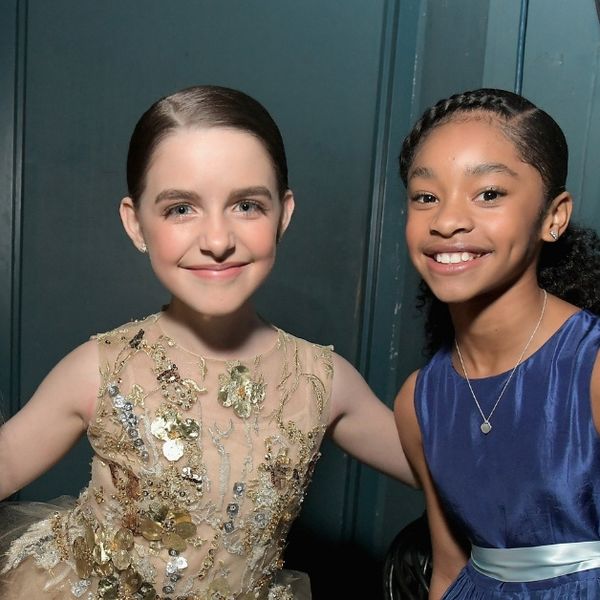March, 2002, HOLLYWOOD - I love Hollywood. It's a part of my hometown, Los Angeles, that I've been stuck on all my life. My life history is literally embedded here.
When I was a kid, it was the exciting part of town that my parents took me to for special occasions - a movie, a dinner, and a drive admiring the glamour of the neon signs and art-deco architecture. As a movie-struck teen-ager, Hollywood Boulevard was where I hung out. It was where I got the only jay walking ticket in my life, dashing across Hollywood Boulevard right in front of the legendary Grauman's Chinese Theater. I spent hours exploring in bookstores on the boulevard, like Larry Edmund's and Pickwick Books, and chancing across stars like John Derek and Gig Young also browsing among the stacks. Music City, on the corner of Sunset Boulevard and Vine Street, was where I went to listen to the latest hit records in the glass booths facing the street. In the evenings, we went to movies at celebrated theaters like the Pantages, the Egyptian, and, of course, Grauman's Chinese Theater.
 But over the years, Hollywood started to decline. The big department store closed down, followed by other fine clothing stores. Seedy operations began opening up. The smaller movie houses shifted their booking to X-rated films. Fine restaurants closed and reopened as greasy spoons. The people on the street changed. We stopped going there at night. When the Pantages and Egyptian theaters went dark, I was shaken. Those were landmarks of our city. It was unthinkable. It was like a death of a loved one. It hurt - and I also felt guilty. I hadn't supported those great movie palaces in years. It was heartbreaking to watch a beloved, once legendary street going derelict.
But over the years, Hollywood started to decline. The big department store closed down, followed by other fine clothing stores. Seedy operations began opening up. The smaller movie houses shifted their booking to X-rated films. Fine restaurants closed and reopened as greasy spoons. The people on the street changed. We stopped going there at night. When the Pantages and Egyptian theaters went dark, I was shaken. Those were landmarks of our city. It was unthinkable. It was like a death of a loved one. It hurt - and I also felt guilty. I hadn't supported those great movie palaces in years. It was heartbreaking to watch a beloved, once legendary street going derelict.
A few hardy institutions were toughing it out against the tide of nastiness and squalor. Musso & Frank's Restaurant, the gathering place of stars since the days of silent movies, had been on the boulevard since 1919. I still went there on occasion for their steaks, chicken pot pies, and, especially, their great martinis. It was wonderful bumping into Ricardo Montalban there shortly after we worked together on "Star Trek II: The Wrath of Kahn."
 And tour buses still congregated at old Grauman's Chinese Theater with its autographed and hand printed forecourt. Through thick and thin, the Chinese was a perennial.
And tour buses still congregated at old Grauman's Chinese Theater with its autographed and hand printed forecourt. Through thick and thin, the Chinese was a perennial.
"Star Trek" did its galactic best to buttress up the renown and traditions of Hollywood. When Gene Roddenberry was honored with his star on the Hollywood Walk of Fame, we all gathered - with the exception of Bill Shatner - to rejoice with our boss, the Great Bird. With each new star on the Walk of Fame for a fellow member of our Star Trek family, we got together to celebrate the happy occasion. And hundreds of fans joined us from far and near.
The year 1986 was my turn and I will never forget the joy of that day. My name embedded in a rose terrazzo star on the sidewalk that I had been walking over all my life! Before feet from all over the world could tread over my good name, my mother, who gave me life and taught me to walk, had to be the very first one to step on my star. She reveled being in the spotlight. After the ceremony, we partied at the historic Hollywood Roosevelt Hotel. Mayor Tom Bradley proclaimed October 30, 1986, George Takei Day in Los Angeles. The heady memory of that day will forever be my personal treasure.
Incredibly, that day was topped by a shared day of jubilation. In the 25th anniversary year of "Star Trek," just before the premiere of "Star Trek VI: The Undiscovered Country," the entire cast was honored with Hollywood's version of consecration - a place in the forecourt of the hallowed Grauman's Chinese Theater. Cheering fans lined both sides of Hollywood Boulevard as we paraded down in convertibles. The USC Marching Band blared away in front of us. We arrived at the Chinese to be greeted by the ever-ebullient Johnny Grant, the Honorary Mayor of Hollywood, with a cortege of young fans dressed as Starfleet officers, Klingon warriors and an Andorian Ambassador or two. This ceremony was going to be unique from any other in the Chinese Theater's long and colorful history. Ours had visitors from throughout the galaxy. A large square of fresh cement moistly awaited our autographs. The studio publicists had instructed us that, due to the limited space, we were to write our autographs only - nothing else. Bill Shatner and Leonard Nimoy led off obediently as instructed with only their signatures on the wet cement. I surmised then, that I was obviously the only one who knew the whole tradition. A handprint must accompany the autograph in the cement. It was tradition. As the only native Angeleno, the responsibility for continuing that tradition lay solely with me. When my turn came, I wrote my name clearly and then, despite the instructions from the studio, I pressed my palm firmly into the wet cement. The shocked exclamation that followed came from Bill Shatner. "George put his hand in!" Then after a pause, "I want to put MY hand in too!" Splat! He slapped his handprint into the moist cement right beside his signature. Pandemonium broke out as everyone else ran to add their handprints to their autographs. Leonard - always thinking in character - placed his handprint in the form of his Vulcan greeting. The continuity of the hallowed rite of the handprint was not broken. I took quiet satisfaction in knowing that I was the one responsible for maintaining that tradition.
The day after that memorable ceremony, I drove down Hollywood Boulevard. Tourists with cameras were still ambling around the Chinese Theater. But the rest of the street had returned to its shabby dereliction. The crowd was gone and the grungy, the delinquent and the deranged had shambled back. "Star Trek" had brought only a brief day of excitement to a growingly forlorn street.
Over the years, there were many initiatives to revitalize Hollywood. Every disappointment was followed by redoubled efforts to reclaim a valued part of the city. Everybody knows Hollywood. From Bombay to Helsinki, from Morocco to Outer Mongolia, Hollywood is a place known throughout the world. In some parts of the world, Hollywood may be better known than Los Angeles itself, of which it is actually a part. Los Angeles could not allow the decline to continue. Hollywood was too valuable and too well known.
 With much effort, a revitalization plan was crafted with tax incentives, historic restoration credits, improved security programs and, most importantly, leadership commitment. When the film appreciation society, American Cinematheque, working closely with the Community Redevelopment Agency of the City of Los Angeles, restored and reopened the historic Egyptian Theater as its new home, the re-ascendance of Hollywood began. It was quickly followed by the welcome return of the Pantages Theater. The great movie palace was magnificently restored and premiered just over a year ago with Disney's stage production of "The Lion King." It is a smash hit still playing today. And, last month, Hollywood saw the spectacular opening of the Kodak Theater and the Babylon Court of Hollywood and Highland. This is the biggest and most fantastically over-the-top complex of theaters, shops, and restaurants in Los Angeles. Just last week, the Japanese American National Museum held its annual dinner in the glamorous new Grand Ballroom on the rooftop of the complex. In two weeks, the Academy of Motion Picture Arts and Sciences will present the Oscars for the highest achievements in motion pictures for the year 2001 in the dazzling new Kodak Theater, designated as its permanent home.
With much effort, a revitalization plan was crafted with tax incentives, historic restoration credits, improved security programs and, most importantly, leadership commitment. When the film appreciation society, American Cinematheque, working closely with the Community Redevelopment Agency of the City of Los Angeles, restored and reopened the historic Egyptian Theater as its new home, the re-ascendance of Hollywood began. It was quickly followed by the welcome return of the Pantages Theater. The great movie palace was magnificently restored and premiered just over a year ago with Disney's stage production of "The Lion King." It is a smash hit still playing today. And, last month, Hollywood saw the spectacular opening of the Kodak Theater and the Babylon Court of Hollywood and Highland. This is the biggest and most fantastically over-the-top complex of theaters, shops, and restaurants in Los Angeles. Just last week, the Japanese American National Museum held its annual dinner in the glamorous new Grand Ballroom on the rooftop of the complex. In two weeks, the Academy of Motion Picture Arts and Sciences will present the Oscars for the highest achievements in motion pictures for the year 2001 in the dazzling new Kodak Theater, designated as its permanent home.
Hollywood Boulevard is where Oscar belongs. It was born 75 years ago at the Hollywood Roosevelt Hotel, just across the street from the Kodak Theater. Since then, Oscar roamed all over Los Angeles and Santa Monica, finally to find a permanent home back on Hollywood Boulevard. Hooray for Hollywood!
The people are coming back. The excitement is coming back. Now that the money is coming back, so are the politics.
There are people politicking to have Hollywood secede from the City of Los Angeles. After Los Angeles had struggled through the tough years of Hollywood, after all the effort and investment to revitalize the area, after the Metro Rail subway system was built to bind Hollywood with the rest of the city, there are activists trying to break away. They are advocating to place a measure on the November ballot declaring Hollywood an independent city. The irony is that, if they did succeed, they will still have to contract with Los Angeles for all their services.
I don't live within the specific boundaries of Hollywood. But, I consider it an intrinsic part of my hometown. I have childhood memories there. I went to summer school at Hollywood High. As a Los Angeles High School cross-country runner, I competed in races against runners from Hollywood High. I work in an industry that is synonymous with Hollywood. I go to movies, eat, play, and spend my money in Hollywood. I don't want a room in my civic home taken away from me.
One more thing - that world famous sign on the hillside of Griffith Park that announces "Hollywood" in great big bold white letters is in Los Angeles. And, we won't give that up. What is Hollywood without the Hollywood sign? It would be like Paris without the Eiffel Tower or New York without the Empire State Building. I say to the activists trying to break away, "give it up." Your effort is misguided. And we ain't giving up our Hollywood sign!









